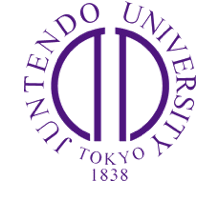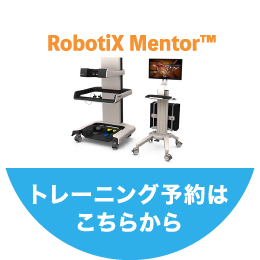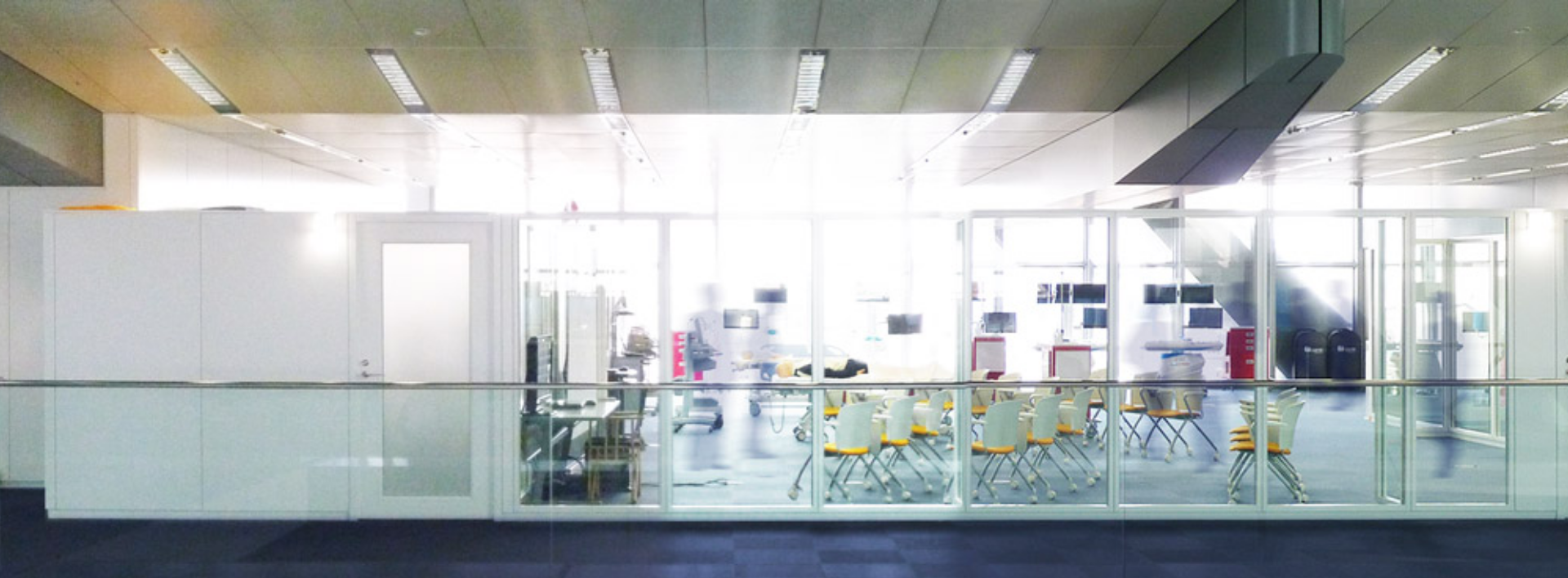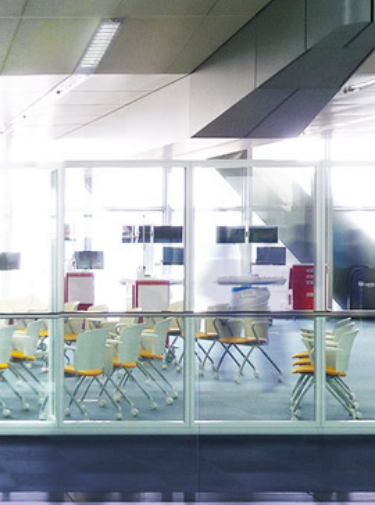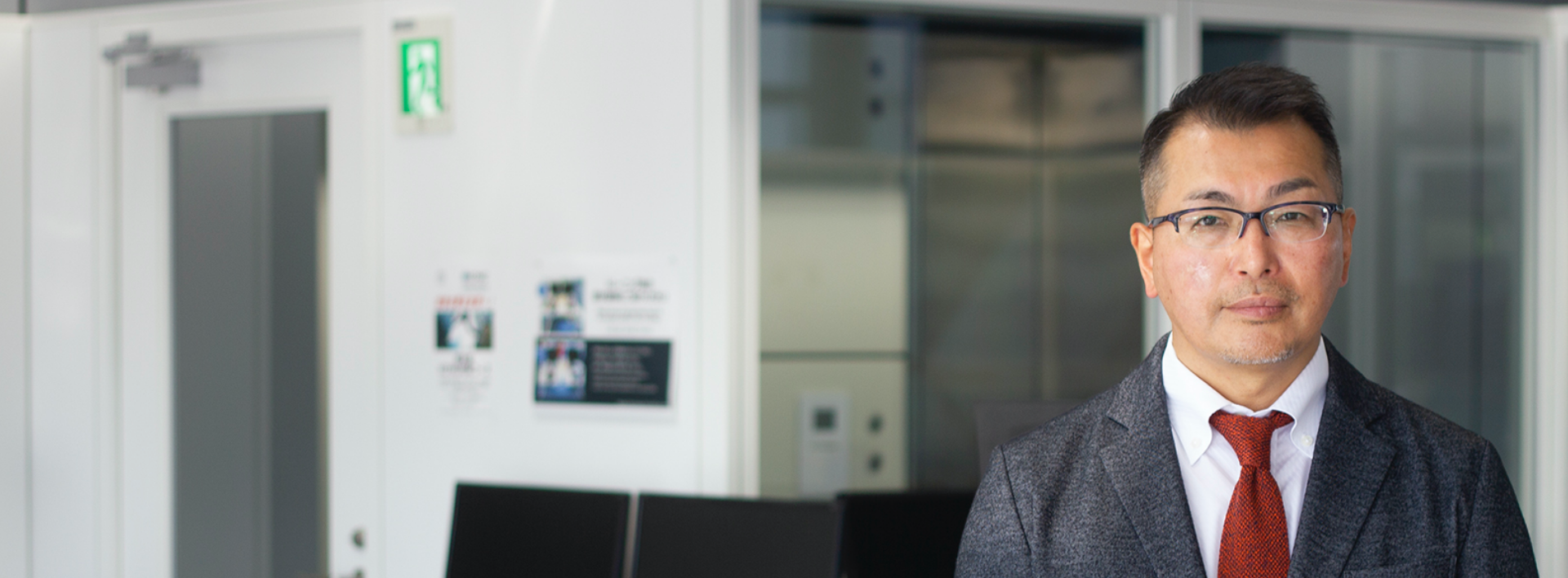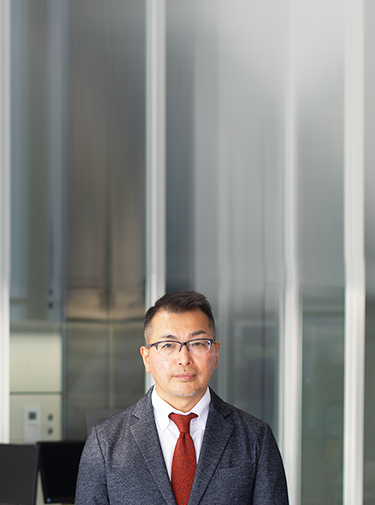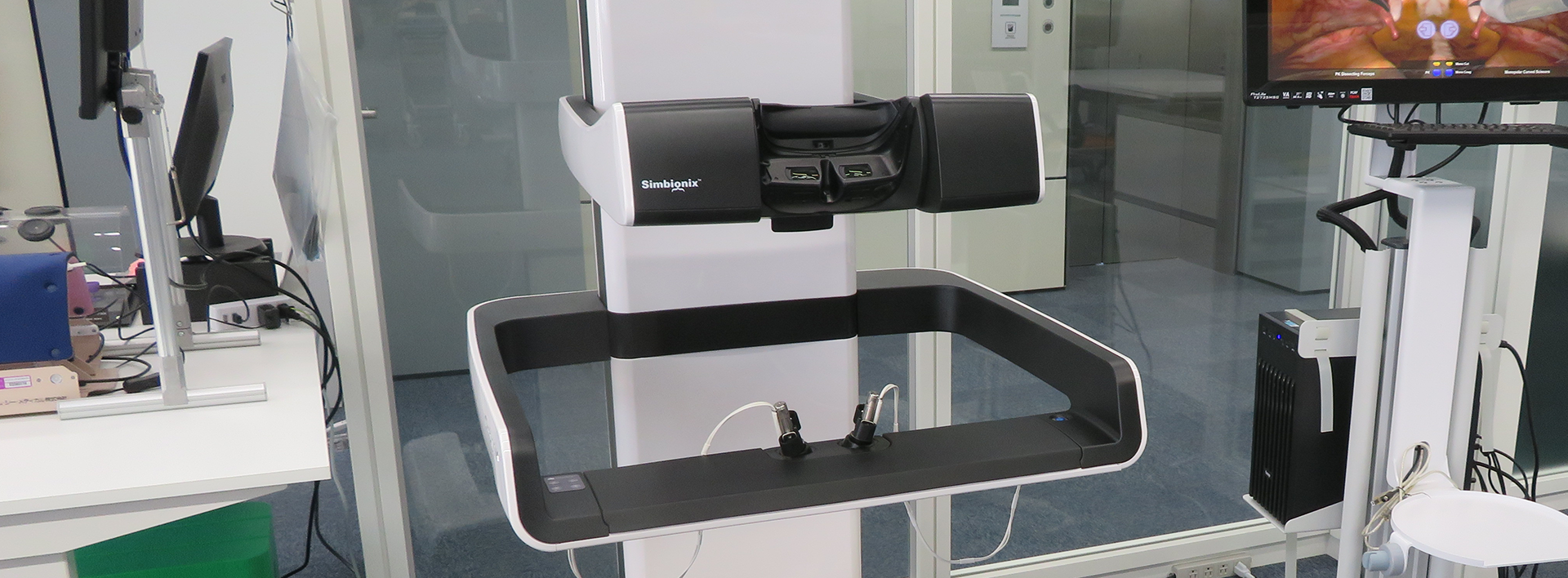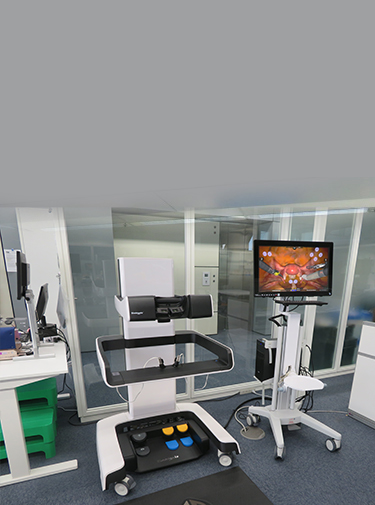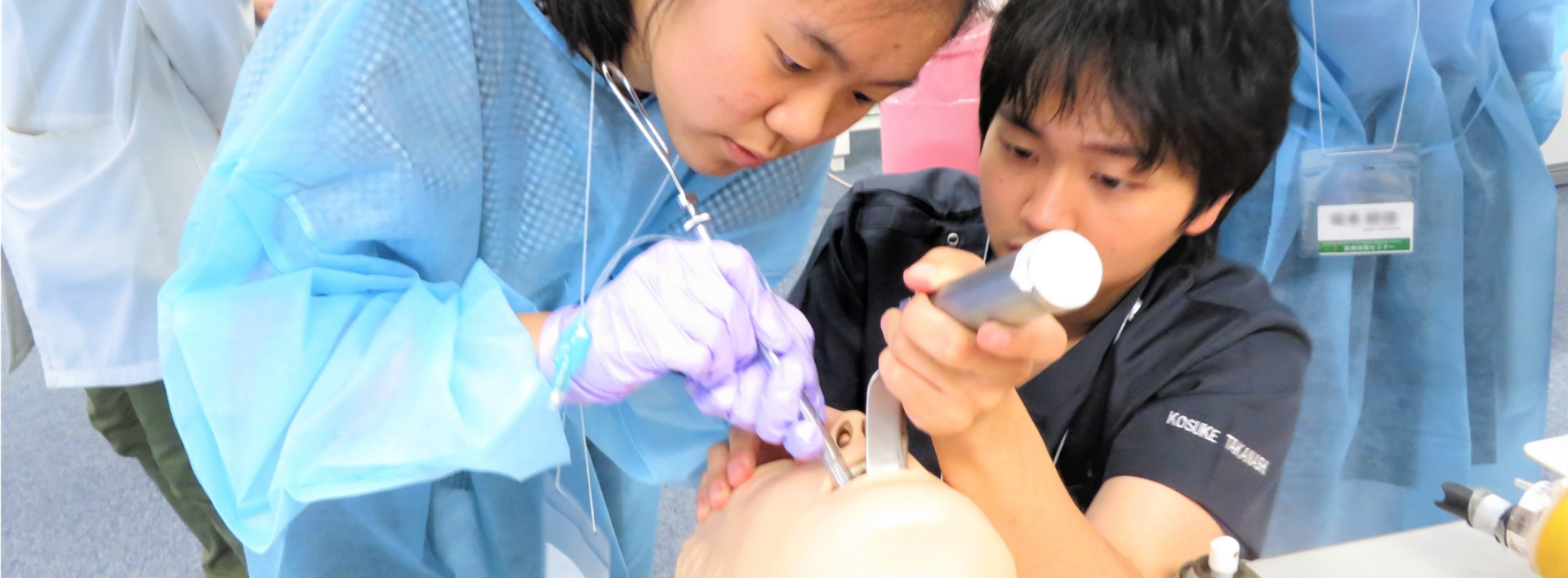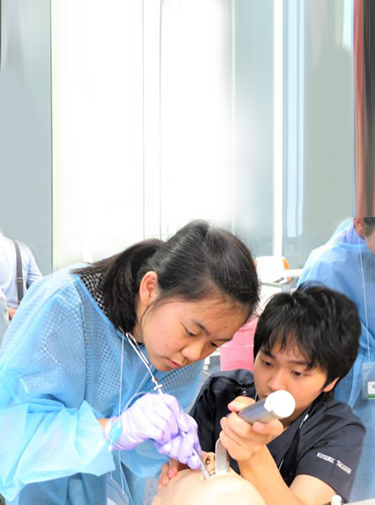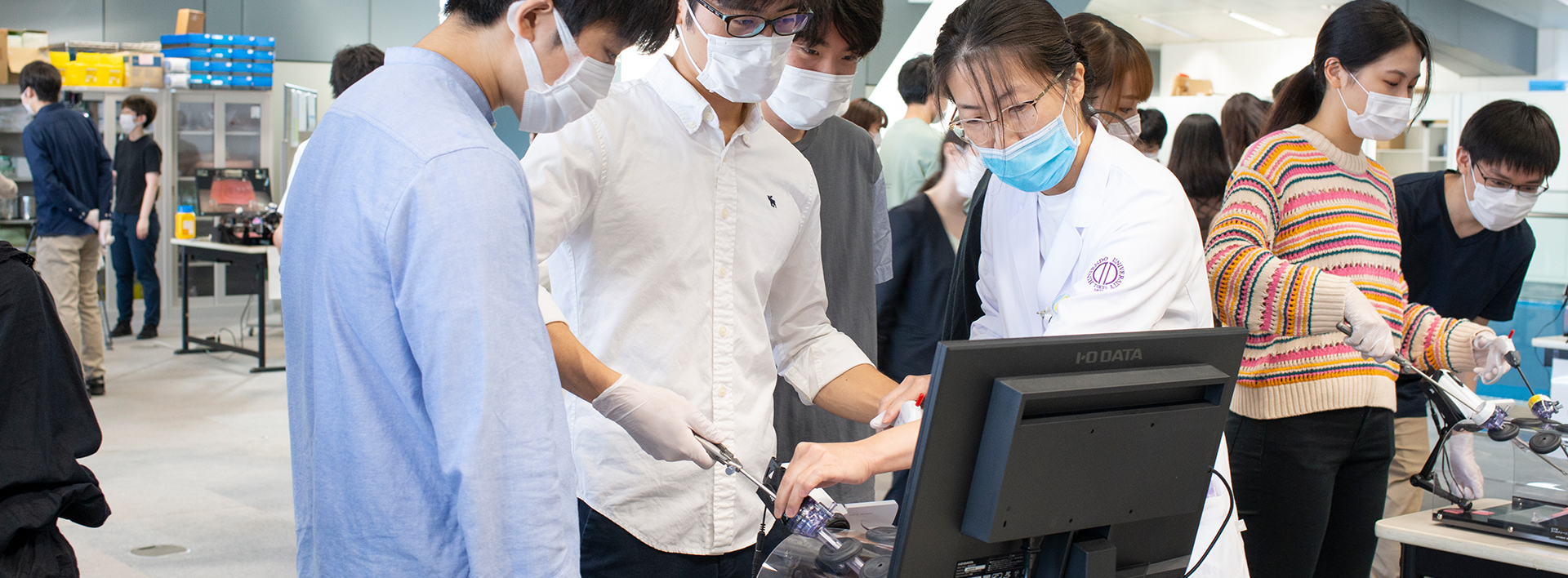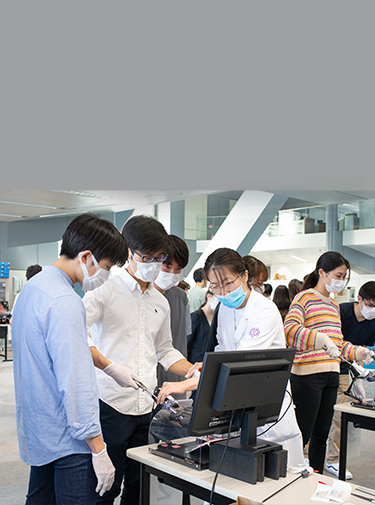English Clinical Skills for International Medicine(一般教育研究室)
Class practice using simulation 4 (シミュレーションセンターを利用した授業実践レポート)
今回は、M4のEnglishの授業をレポートいたします。医学教育研究室の關根美和先生に英訳いただきました。英文も併せてご覧ください。
【English Clinical Skills for International Medicine(M4) 】
講師:デシュパンデ・ゴータム先生(順天堂大学 大学院総合診療科特任教授)
担当:医学部一般教育研究室 浅野恵子先生、マーセラス・ニ―リー先生
医学教育研究室 デービッド・アニ氏、關根美和先生
Lecturer:
Prof. Gautam A. Deshpande, MD, professor at Juntendo University Faculty of Medicine
Staff:
Keiko Asano, Associate professor, Juntendo University Faculty of Medicine
Marcellus Nealy, Associate professor, Juntendo University Faculty of Medicine
Miwa Sekine, Assistant professor, Department of Medical Education
David Aune, graduate student, Department of Medical Education
4年生のEnglishの授業は、1年生より行われているTOEFL、IELTSに向けた学習内容に加え、USMLEも視野に入れた、より専門的なレベルで行われます。USMLEでは、「患者をどのように扱うか」といった自己責任ですべてを判断・決断していく、医師としてのマネージメント能力も問われるため、そういったシミュレーションテストに対応する能力を早期から養う目的で、このEnglishの授業が今年度より4年生に開設されました。
その診療シミュレーション実習がシミュレーションセンターにて行われています。講師は、在日アメリカ大使館の診療医であり、日本国内数々の医学部で学生のご指導にあたられている、デシュパンデ・ゴータム先生です。
A new English course has opened this April for 4th-year medical students.
The English class for 4th-year medical students is specialized to prepare for USMLE in addition to the TOEFL/IELTS course started at the beginning of school.
This new class aims to nurture self-reliance as well as developing management skills as physicians focusing on “How to treat patients” in the early stages of medical education.
This medical examination training has been conducted in the simulation center. The lecturer of this class is Prof. Gautam A. Deshpande, MD, professor at Juntendo University, Physician and Post Medical Advisor at the American Embassy in Tokyo.
デシュパンデ先生の授業は、先生のユニークなお人柄でいつも笑いが絶えず、大変盛り上がります。授業はまず学生の自己紹介をし、先生がコメントを返すところ、すなわち問診を行う上で患者とのコミュニケーションをとる必要性を学生が体感することから始まります。
Dr. Deshpande’s class starts with student introductions and conversation with individual students, so students feel the necessity of communication skills. The class is filled with excitement and laughter thanks to his teaching style which is thoughtful and humorous.
そして、問診を行う手順や患者とのやり取りで大切にすること、問診上で日本とアメリカの違いも併せて確認され、実際に初期診療のシミュレーションが行われます。シミュレーション時は、患者役を医学教育研究室のアニ氏が行い、医師役の学生がアニ氏を診察する設定で行います。デシュパンデ先生からは随時、患者に質問する際の言葉選びや質問内容が的確かどうかのアドバイスがなされます。
In the class, students will learn the steps of examination, things that should be kept in mind, and the difference between Japanese medical examination style and American medical examination style through lectures and role plays. The role play is set up so that students play the doctor role and Mr. Aune plays the patients role. Tips and advice on using appropriate words and sentences and/or questions are given at any time during the role play.
この日は初診時の問診で「chest pain」の診断をテーマに、学生が現病歴や既往歴を順に質問し、鑑別診断するところまでのシミュレーションでした。疾患を特定するために「年齢を聞くことで疑う病気は?(ID)」「いつ症状が現れるか、を聞くことでわかることは?(Social history)」「摂取しているものからわかることは?(Social history)」「症状から考えられる疾患は?」と学生全体に問いかけ、海外の生活スタイルで見られる症状についても説明されながら繰り返しシミュレーションが行われました。
The pictures below are from the role play of medical examination steps when the patient complains of chest pain.
Students ask the patient about their medical history and social history to differentially diagnose the disease. The role play is conducted step by step to identify the disease with tips and advice such as “what kind of illness can you think of based on the patient’s age?”(ID), “what can you learn by asking when the symptom started?”, “What do you know from what medications patients are taking?”(Social history) and finally, “what do you think the disease is?”
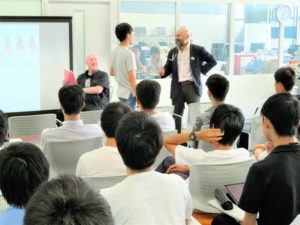
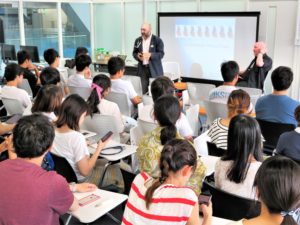
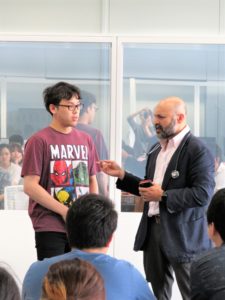
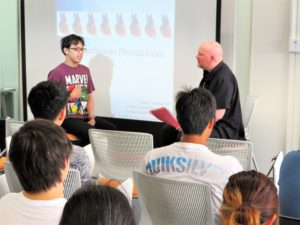
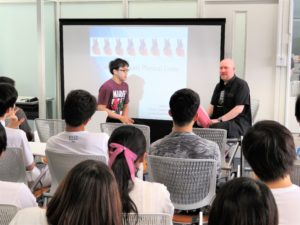
Pictures of role-play.
アニ氏との問診シミュレーションの様子
また、聴診や「どこがどのように痛いのか」の目視検査(現病歴から推測)を行う実習も学生同士のペアで行われ、わからない言い回しを先生へ質問したり、調べながら英語での診察を学習していました。
授業は全8回、1グループ17名ほどの学生がローテーションで受講します。2コマ連続で授業が行われることもありますが、授業後も先生に質問する学生が列をなすほど、学生の意欲の高い授業となっています。
Students work in pairs to practice role plays using stethoscopes, visual indications to understand the area of pain, while asking Dr.Deshpande or looking up what to say in some situations to study medical examinations in English.
The class is divided into 8 groups (15-17students/group) which rotate for the role play sessions and the course is 15 classes in total including 2 role play classes for each group. The students are so enthusiastic that many of them line up to ask questions even after the class.
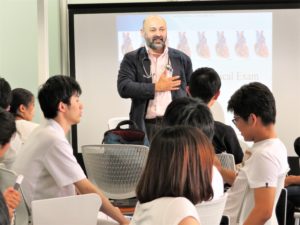
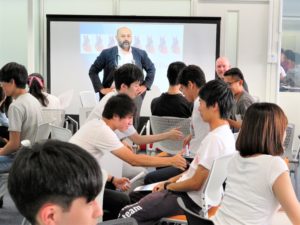
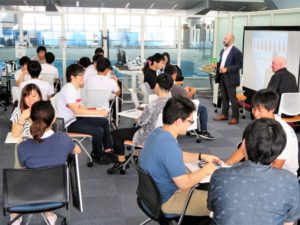
実際に手技を行いながら、模擬診察をトレーニング
Role plays using physical examination.
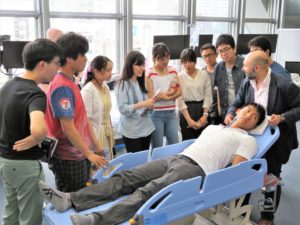
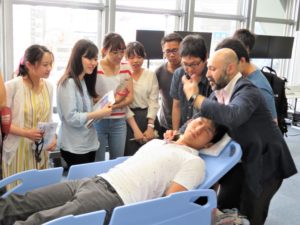
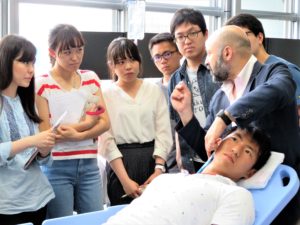
授業後も学生からの質問に対し、実際にモデルを置いてレクチャー。学生がどんどん集まり、興味深く聞いています。
Students are gathering to watch and ask questions of Dr.Deshpande after class.
